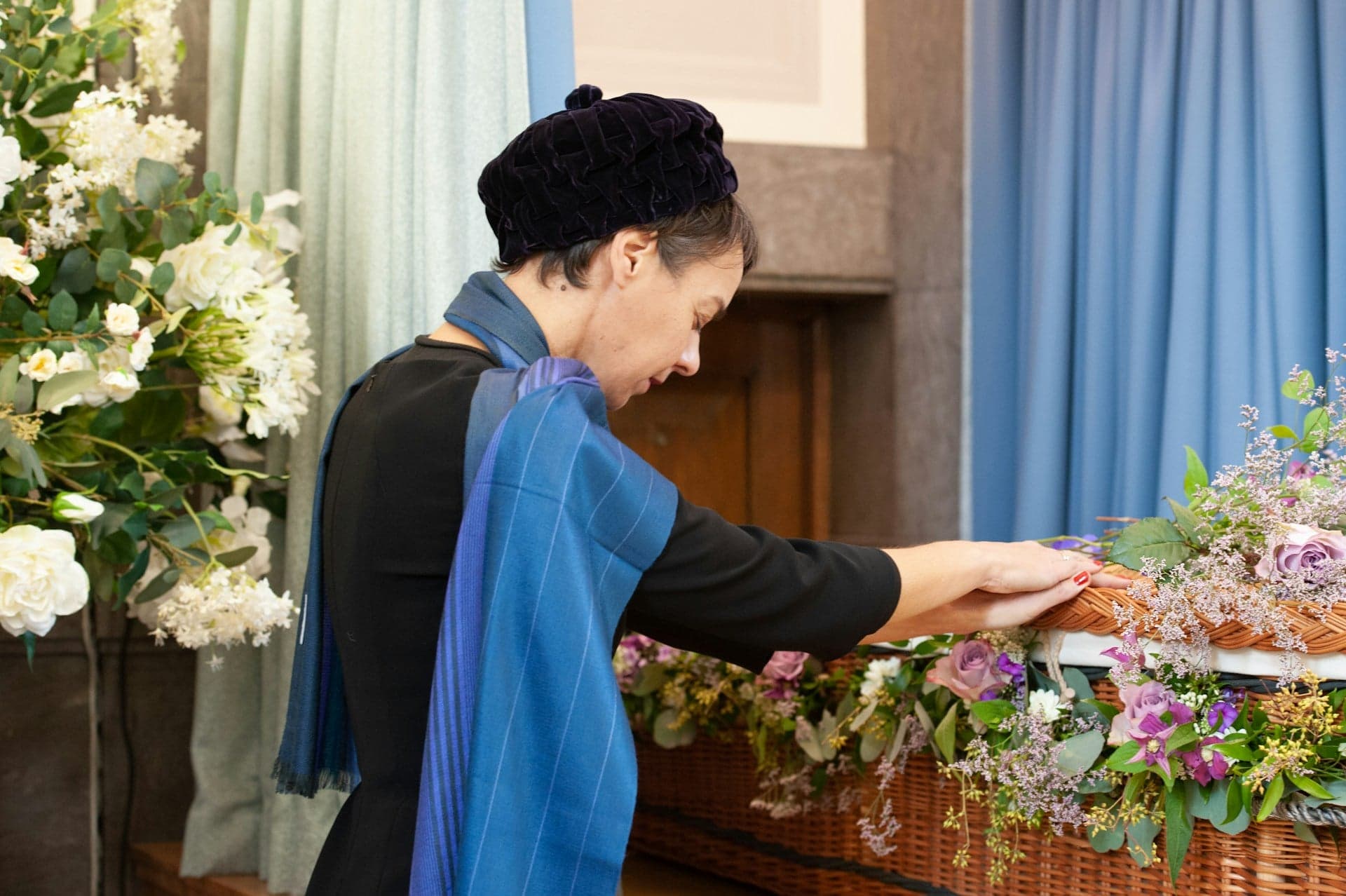The role of music in funerals: tradition, symbolism and modern choices

Introduction
Since the dawn of time, music has accompanied the most important moments of our lives. Births, weddings, and also deaths. In funeral ceremonies, it occupies a unique place: it consoles, it brings people together, it expresses what words cannot always say.
Choosing funeral music for a farewell ceremony is not insignificant. It is a powerful way to honour the personality of the deceased, to convey a message to loved ones and to create a moment of collective contemplation. Whether it be traditional funeral hymns, classical music or a modern song that had particular significance, each musical choice tells a story.
Today, families have unprecedented freedom to compose a personalised ceremony playlist. Conventions have relaxed, traditions are adapting, and the symbolism of music remains as strong as ever. But how do you make the right choices? What are the musical traditions according to religions? Which music best reflects the life and values of the deceased?
This guide accompanies you in this delicate reflection. You will find historical reference points, practical advice and concrete suggestions to create a musical ceremony that has meaning.
📌 Summary (TL;DR)
Music is an essential element of funerals, present in all cultures and religions. It helps to express the emotions of grief, honours the memory of the deceased and creates a moment of collective contemplation. This guide explores religious musical traditions, gives advice for choosing pieces suited to the personality of the deceased and offers concrete suggestions, from classical to contemporary.
Partner funeral homes can accompany you in the musical organisation of the ceremony and help you make choices that correspond to your wishes.
📚 Table of contents
Music in funeral rituals: a thousand-year-old history
Since antiquity, music has accompanied rites of passage and funeral ceremonies. The Egyptians used ritual chants, the ancient Greeks played the flute during funeral processions.
This tradition crosses all cultures: African drums, Asian gongs, European Gregorian chants. Funeral music expresses what words cannot say, creating a bridge between the living and the deceased.
Even today, it remains a central element of farewell ceremonies. To discover other traditions, consult our article on mourning rituals around the world.
Why music is essential in the grieving process
Funeral music plays a major psychological role. It allows the expression of emotions that are difficult to verbalise: sadness, love, gratitude, hope.
It also creates a moment of collective contemplation, unifying the congregation in a shared experience. Familiar melodies bring comfort and honour the memory of the deceased.
As a universal language, music transcends cultural and generational differences. It helps loved ones to go through this painful stage by giving meaning to the ceremony.
Musical traditions according to religions
Each religious tradition has its own musical specificities. In Switzerland, a multicultural country, Catholics, Protestants, Muslims and Jews coexist with their own funeral rites.
Understanding these differences helps to organise a ceremony that respects the beliefs of the deceased. Some religions favour liturgical hymns, others sobriety or even silence.
To explore these distinctions further, consult our guide on funerals according to religions.
Catholic music: between liturgical hymns and organ
The Catholic funeral mass incorporates traditional hymns: Ave Maria, Requiem by Mozart or Fauré, liturgical hymns.
The organ occupies a central place, accompanying the key moments of the ceremony. Psalms and canticles punctuate the liturgy.
Some parishes authorise personal hymns in addition to the obligatory liturgical pieces. Enquire with your parish to find out the possibilities.
Protestant music: sobriety and canticles
Protestant funerals favour sobriety. Canticles and psalms constitute the essence of Protestant funeral music.
Reformed communities generally offer more flexibility than Catholics. You can incorporate songs that are meaningful to the deceased.
The organ remains present but in a more discreet manner. The musical choice reflects the simplicity and authenticity characteristic of the Protestant tradition.
Other religious traditions: Muslim, Jewish, Buddhist
Muslim funerals generally take place without music. The recitation of the Quran and prayers constitute the essence of the ceremony.
In the Jewish tradition, instrumental music is rare. Sung prayers and psalms are favoured.
Buddhist ceremonies incorporate ritual chants and mantras. These traditions respect strict codes that should be known before organising the ceremony.
How to choose music for a funeral ceremony
The musical choice for a funeral requires reflection. Several criteria will guide you: the personality of the deceased, the religious or civil setting, the expectations of the congregation.
The balance between tradition and personalisation is essential. Some families prefer timeless classics, others dare to choose modern songs.
Plan for 3 to 5 pieces maximum so as not to weigh down the ceremony. Each piece must have meaning and contribute to the tribute paid.
Reflecting the personality of the deceased
The ceremony playlist must tell a story: that of the person who has passed away. Their musical tastes, their passions, the songs that marked their life.
A jazz enthusiast deserves a musical tribute in their image. A classical music lover would appreciate Mozart or Bach.
This personalisation transforms the ceremony into a true celebration of life. It also helps loved ones to remember the moments shared with the deceased.
Adapting the choice to the type of ceremony
A religious ceremony imposes liturgical constraints. Find out about the pieces authorised by the place of worship.
A civil ceremony offers complete freedom. You can choose any piece, religious or not.
Cremation or burial also influence the musical tone. To better understand these options, consult our article on cremation or burial.
Considering the emotion and message to convey
The emotional tone guides your musical choices. Soothing pieces favour contemplation. More joyful songs celebrate a life well lived.
Find the balance between sadness and hope. Music must accompany grief without weighing it down.
Think about the message you wish to convey: gratitude, love, continuity, peace. Each piece contributes to creating this particular atmosphere.
Suggestions for funeral music
Here are concrete suggestions to help you with your choice. These lists are not exhaustive but represent the most frequently chosen pieces.
Classified by categories, these examples cover different styles and traditions. Adapt them according to your needs and the personality of the deceased.
Do not hesitate to combine several styles to create a unique and personal ceremony.
Classical and timeless music
Classic funeral hymns remain safe choices:
Ave Maria (Schubert or Gounod): purity and spiritual elevation
Requiem (Mozart or Fauré): prayer for the repose of the soul
Adagio by Albinoni: profound melancholy
Canon by Pachelbel: serenity and harmony
Air on the G String (Bach): peaceful contemplation
These pieces transcend generations and are suitable for almost all ceremonies.
Modern French-language songs
For a more personal ceremony, these funeral songs are deeply moving:
"Ne me quitte pas" (Jacques Brel): love and attachment
"Quand on n'a que l'amour" (Brel): humanity and hope
"L'hymne à l'amour" (Édith Piaf): eternal love
"Je suis malade" (Serge Lama): pain and vulnerability
"S'il suffisait d'aimer" (Céline Dion): tenderness
These French-language classics resonate particularly in French-speaking Switzerland.
International and contemporary music
These English-language pieces are also highly appreciated:
"Hallelujah" (Leonard Cohen): universal spirituality
"Imagine" (John Lennon): peace and unity
"Time to Say Goodbye": farewell in beauty
"My Way" (Frank Sinatra): self-affirmation
"Angels" (Robbie Williams): celestial protection
These songs transcend language barriers through their universal emotion.
Music to celebrate a life
For a ceremony celebrating life rather than centred on sadness:
"What a Wonderful World" (Louis Armstrong): gratitude and beauty
"Somewhere Over the Rainbow": hope and dream
"You Raise Me Up": inspiration and strength
"Here Comes the Sun" (The Beatles): renewal
These soothing pieces create an atmosphere of recognition and inner peace.
Practical aspects: who takes care of the music?
The musical organisation is generally coordinated with the funeral home. It advises you on the technical possibilities: audio recording, live musicians, organist.
Check the sound system capabilities of the venue. Some crematoriums or churches have limited equipment.
Budget to plan for: 200-500 CHF for a professional musician. Recordings cost less but have less emotional impact.
Wolky partner funeral homes accompany you in these choices and practical steps.
Music has accompanied our farewells since the dawn of time. It gives a voice to what words cannot express, soothes broken hearts and celebrates the lives of those who have left us. Whether it be a traditional liturgical hymn, a popular song or a melody that evoked a precious memory, each musical choice transforms a ceremony into a deeply personal moment.
Catholic, Protestant, secular or multicultural, each funeral tradition gives music a unique place. The essential thing remains to choose pieces that authentically reflect the personality of the deceased and that resonate with the collective emotion of the congregation.
Are you organising a farewell ceremony and wish to share the memory of a loved one with dignity? Wolky allows you to publish an obituary online for 180 CHF, accessible 24/7, and to create a memorial space where photos, anecdotes and musical memories find their place. Need support? Consult our directory of funeral homes in Switzerland to find a trusted partner near you.


